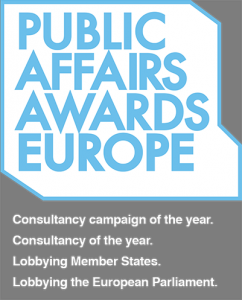 Alber & Geiger has been recognised for the fourth consecutive year as one of the top lobbying firms in Europe. The firm was shortlisted in four categories, including Lobbying the European Parliament, Consultancy Campaign of the Year and Consultancy of the Year by the Public Affairs Awards Europe 2018. Alber & Geiger picked up the award for the second year in a row in the Lobbying Member States category for its ability to generate Member State support at the EU level as well as work at national and local level in particular Member States.
Alber & Geiger has been recognised for the fourth consecutive year as one of the top lobbying firms in Europe. The firm was shortlisted in four categories, including Lobbying the European Parliament, Consultancy Campaign of the Year and Consultancy of the Year by the Public Affairs Awards Europe 2018. Alber & Geiger picked up the award for the second year in a row in the Lobbying Member States category for its ability to generate Member State support at the EU level as well as work at national and local level in particular Member States.
Alber & Geiger’s team has decades of experience in representing clients in Europe through a broad range of activity. Our team is involved in many EU policy issues and regulatory matters, as well as active before all EU institutions and agencies, in addition to special national and local officials at the Member State level in Europe. Many of Alber & Geiger’s practitioners have a deep understanding of EU legislative and administrative procedures.

 On 7 November 2018, the European Commission adopted a Communication on endocrine disruptors. The Communication lays the groundwork for potential, new regulatory measures that will address endocrine disruptors across different areas in the EU, and beyond.
On 7 November 2018, the European Commission adopted a Communication on endocrine disruptors. The Communication lays the groundwork for potential, new regulatory measures that will address endocrine disruptors across different areas in the EU, and beyond. In April this year, the European Commission put forward an EU approach to artificial intelligence and robotics. The EU’s plans include funding to encourage the uptake between public and private sectors. Moreover, the EU’s approach foresees support to education and labour to prepare for the deployment of AI. Last, while the EU is determined to stay at the front of this technological development, it will also work on ensuring a proper legal and ethical framework.
In April this year, the European Commission put forward an EU approach to artificial intelligence and robotics. The EU’s plans include funding to encourage the uptake between public and private sectors. Moreover, the EU’s approach foresees support to education and labour to prepare for the deployment of AI. Last, while the EU is determined to stay at the front of this technological development, it will also work on ensuring a proper legal and ethical framework. The public consultations on the robustness of the EU air quality legislations, comprised of the two Ambient Air Quality Directives as well as of the Implementing Decision and the Commission Directive have recently been finalized.
The public consultations on the robustness of the EU air quality legislations, comprised of the two Ambient Air Quality Directives as well as of the Implementing Decision and the Commission Directive have recently been finalized. In 2014, following threats to the rule of law in several Member States, the European Commission decided to launch a framework to address such systemic threats through dialogue with the concerned countries. Until now the process consists of an assessment of the problems, followed by concrete recommendations and a monitoring mechanism.
In 2014, following threats to the rule of law in several Member States, the European Commission decided to launch a framework to address such systemic threats through dialogue with the concerned countries. Until now the process consists of an assessment of the problems, followed by concrete recommendations and a monitoring mechanism. The European Commission has recently launched the debate on the fitness check of the backbone of its legislation on water protection and management. Therefore, the Water Framework Directive as well as the closely related Groundwater Directive, the Environmental Quality Standards Directive as well as the Flood Directive are currently under review.
The European Commission has recently launched the debate on the fitness check of the backbone of its legislation on water protection and management. Therefore, the Water Framework Directive as well as the closely related Groundwater Directive, the Environmental Quality Standards Directive as well as the Flood Directive are currently under review.